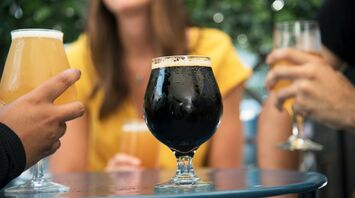Discover Poitín: Ireland’s Historic Spirit Making a Comeback

Illegal for over 300 years, poitín became legal in 1997 and gained protected status a decade later. Thanks to passionate distillers and creative mixologists, its renaissance is now in full swing.
Eight years ago, a friend led me to a cave in County Fermanagh that housed an old pot still, once used for the illegal distillation of poitín. This historic Irish spirit has evolved significantly from its days of secretive production.
A Storied Past
Poitín’s origins trace back to monks distilling aqua vitae, later transitioning to community production after the dissolution of monasteries in the 16th century. In 1661, a British tax on alcohol led to the creation of ‘parliament whiskey’ and the untaxed, illegal poitín. Despite its illegality, poitín remained popular, produced in hidden stills across rural Ireland from various fermentable crops like barley, sugar beet, and potatoes. Its legalisation in 1997 marked a new era for the spirit.
Modern Revival
My first taste of poitín in 1997 left me unimpressed, but the smoothness of Micil’s Heritage Poitín, made with oats and barley, changed my perspective. Micil Distillery in Salthill, Galway, offers an insightful tour into the history and craft of poitín, led by founder Pádraic Ó Griallais. Pádraic, a sixth-generation distiller, shared stories of how his ancestors used Galway’s terrain to hide their operations.
Legalisation brought changes, including indoor distillation methods that enhance flavor. Poitín now benefits from year-round production, overcoming challenges faced by illicit distillers who avoided summer due to competing wild yeast and bacteria.
Cocktail Culture
Poitín received Geographic Indication status in 2008, and production methods were codified in 2015. Its export market is expanding, with predictions of reaching one million cases by 2025. Brands like Bán Poitín, founded by Dave Mulligan, are leading the revival. Bán Poitín, made with barley, sugar beet, and Comber potatoes, is featured prominently at Mulligan’s Bar 1661 in Dublin. The bar showcases poitín’s versatility in cocktails, such as the popular Belfast coffee.
Other notable poitín brands include Mad March Hare, Killowen Distillery, and Tipperary Distillery. Each brings unique qualities, with distillers like Brendan Carty and Jennifer Nickerson contributing to the craft’s resurgence.
For travelers to Ireland, poitín offers a taste of history and tradition. With its rich heritage and modern innovation, this once-illegal spirit is worth seeking out and savoring.



















